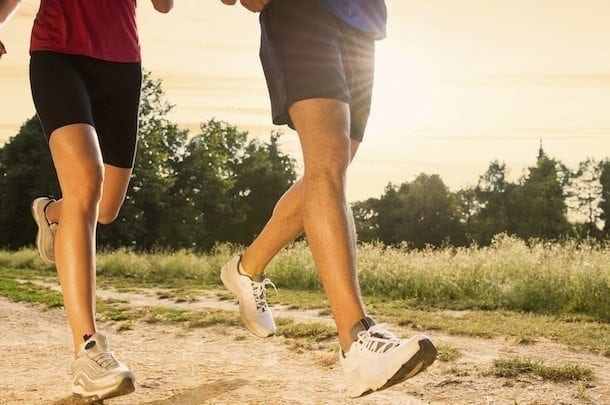Q. I’m heavy and I want to start running to lose weight. Should I worry about my knees?
Yes and no. Let’s deal with the yes first. You should be cautious because extra pounds put a lot of extra force on your knees. Consider that the weight translated through the knee during running can be four or five times your weight. So the grim math goes like this: If you are 15 pounds overweight, that’s an extra 75 pounds on your knees, and an extra 50 pounds is equal to up to 250 pounds.
Okay, enough of the doom and gloom. Running will help you lose weight—and you’ll see an even bigger impact if you combine that new activity with dietary changes. As you lose the extra weight, the pressure on your knees will decrease exponentially. Another good result, running and other weight-bearing activities will load (force applied) and unload (force removed) your joints, which will improve circulation in the area, bringing in fresh blood and oxygen and flushing waste away from the joint. But—and this is a big BUT—if the joint is out of alignment, you risk injury.
So let’s talk about a balanced body. I believe that balance is the single most important factor for you across the board. If you are balanced you can do anything.
A balanced body is in proper alignment, is fully functional, and is able to recruit all muscles appropriately. Essentially, it is the way most of us felt when we were 16. As a teenager, there was no, “This is gonna hurt tomorrow,” mentality. We barely cared about warms up and had no idea what a cool down might be. We just worked. If we wanted to run 8 miles, we did it. And our bodies just worked.
Your muscles are your first line of defense in any activity. If muscles don’t absorb the force properly something else will have to absorb it. That something else is going to be your bones, joints, and cartilage.
In an imbalanced body ankles roll, backs hurt, hip flexors are tight, and so on—you get the idea. If you are imbalanced, your force absorption is imbalanced. Running increases the force translated through your joints and therefore increases the imbalance force.
Back to the knee: A knee is designed to bend and straighten (frontal plane movement). No one wants to see a knee twist (transverse plane movement). Injury occurs when the knee moves in the frontal and transverse plane in either one big gigantic disaster or from prolonged misuse. If it’s not working when you’re walking, then surely you’re not running properly.
Here are a few concrete suggestions:
1. Warm up properly A proper dynamic warm up is useful to make sure your muscles are working reflexively. After sitting for 8 hours, you need to prepare your body for exercise. A dynamic warm up is a specific movement pattern that will turn on muscles that you need to properly do a movement, such as lunges or squats, not just reaching for your toes and holding.
2. Strengthen your core Developing core stability and strength will help your body absorb force properly and take some pressure off the knees. When I say core, I mean abs, as well as glutes, lats, and hips.
3. Adjust your running form When you run, focus on keeping your knees in alignment. Unbalanced runners tend to have their knees fall in—try to keep them straight.
4. Gear up! Get yourself some good, supportive shoes designed specifically for running.
5. Pay attention to your body My advice for running and all other activities is to listen to your body. If it causes you pain, stop doing it and get checked out by a medical professional.
If you want to run, by all means, run. Just run smart!
Got a question for David? Ask in the comments below and you might see the answer appear here on the blog in a few weeks!




